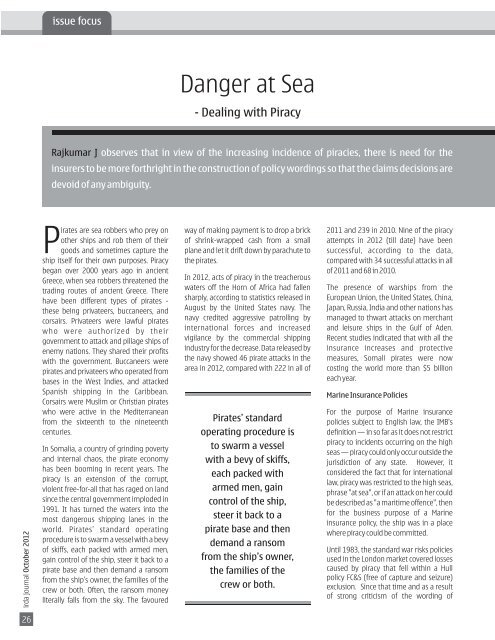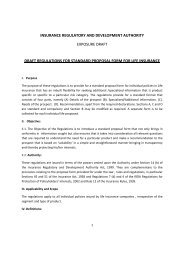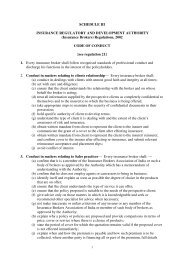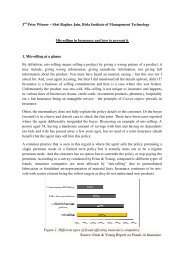issue focusDanger at Sea- Dealing with PiracyRajkumar J observes that in view of the increasing incidence of piracies, there is need for theinsurers to be more forthright in the construction of policy wordings so that the claims decisions aredevoid of any ambiguity.irda journal October 2012Pirates are sea robbers who prey onother ships and rob them of theirgoods and sometimes capture theship itself for their own purposes. Piracybegan over 2000 years ago in ancientGreece, when sea robbers threatened thetrading routes of ancient Greece. Therehave been different types of pirates -these being privateers, buccaneers, andcorsairs. Privateers were lawful pirateswho were authorized by theirgovernment to attack and pillage ships ofenemy nations. They shared their profitswith the government. Buccaneers werepirates and privateers who operated frombases in the West Indies, and attackedSpanish shipping in the Caribbean.Corsairs were Muslim or Christian pirateswho were active in the Mediterraneanfrom the sixteenth to the nineteenthcenturies.In Somalia, a country of grinding povertyand internal chaos, the pirate economyhas been booming in recent years. Thepiracy is an extension of the corrupt,violent free-for-all that has raged on landsince the central government imploded in1991. It has turned the waters into themost dangerous shipping lanes in theworld. Pirates’ standard operatingprocedure is to swarm a vessel with a bevyof skiffs, each packed with armed men,gain control of the ship, steer it back to apirate base and then demand a ransomfrom the ship’s owner, the families of thecrew or both. Often, the ransom moneyliterally falls from the sky. The favouredway of making payment is to drop a brickof shrink-wrapped cash from a smallplane and let it drift down by parachute tothe pirates.In 2012, acts of piracy in the treacherouswaters off the Horn of Africa had fallensharply, according to statistics released inAugust by the United States navy. Thenavy credited aggressive patrolling byinternational forces and increasedvigilance by the commercial shippingindustry for the decrease. Data released bythe navy showed 46 pirate attacks in thearea in 2012, compared with 222 in all ofPirates’ standardoperating procedure isto swarm a vesselwith a bevy of skiffs,each packed witharmed men, gaincontrol of the ship,steer it back to apirate base and thendemand a ransomfrom the ship’s owner,the families of thecrew or both.2011 and 239 in 2010. Nine of the piracyattempts in 2012 (till date) have beensuccessful, according to the data,compared with 34 successful attacks in allof 2011 and 68 in 2010.The presence of warships from theEuropean Union, the United States, China,Japan, Russia, India and other nations hasmanaged to thwart attacks on merchantand leisure ships in the Gulf of Aden.Recent studies indicated that with all theinsurance increases and protectivemeasures, Somali pirates were nowcosting the world more than $5 billioneach year.Marine Insurance PoliciesFor the purpose of Marine insurancepolicies subject to English law, the IMB'sdefinition — in so far as it does not restrictpiracy to incidents occurring on the highseas — piracy could only occur outside thejurisdiction of any state. However, itconsidered the fact that for internationallaw, piracy was restricted to the high seas,phrase "at sea", or if an attack on her couldbe described as "a maritime offence", thenfor the business purpose of a Marineinsurance policy, the ship was in a placewhere piracy could be committed.Until 1983, the standard war risks policiesused in the London market covered lossescaused by piracy that fell within a Hullpolicy FC&S (free of capture and seizure)exclusion. Since that time and as a resultof strong criticism of the wording of26
marine policies generally, new policywordings were introduced by both Lloyd'sand the Institute of London Underwriters.The Institute Time Clauses (Hulls) wererevised in October 1983, and from thattime, they included cover against piracy asa hull risk. This feature remainedunchanged when the clauses were againrevised in 1995. In those ITC wordingsthere is cover for the perils of "violent theftby persons from outside the vessel" underClause 6.1.3, and for "piracy" under Clause6.1.5. Subsequently, the InternationalHull Clauses (IHC) became available,having been introduced in 2002 andamended in 2003. The correspondingclauses in both versions of the IHC are2.1.3 (violent theft) and 2.1.5 (piracy). Butthere is no definition of either peril in anyof the wordings. A later development isthe ability of underwriters to transferpiracy cover [back] into war risk policies,using clauses drafted by the Joint HullCommittee and the Joint War Committee.One benefit of this, similar to a benefit ofhaving Hull insurance and war risks coverwith the same underwriter, is to avoiddifficulties in differentiating betweenpiracy and terrorism. Use of the additionalclauses is optional, and most Hull and Warrisks policies do not incorporate them. Asurprising number of policies are stillwritten on the basis of the 1983 clauses,which are preferred by many owners.War RisksIn their basic forms, the ITC (Hulls) 1983and 1995 wordings, and the IHC 2003wording, all exclude the consequences ofwar and civil war (etc.); capture or seizureof a vessel other than as an act of piracy;and acts of terrorism or of a person actingmaliciously or from a political motive —but they do so in slightly different terms.Both sets of war and terrorism exclusionclauses are classed as "paramount" andthey claim to "override anythingcontained in this insurance inconsistenttherewith."More than 10% of all seaborne oil passesthrough the Gulf of Aden to the Suez Canal.The alternate route, traveling around thesouthern tip of Africa, is significantlylonger and more expensive. Routing asingle tanker from Saudi Arabia to theUnited States around the Cape of GoodHope adds approximately 2,700 miles toUse of the additionalclauses is optional,and most Hull andWar risks policies donot incorporate them.A surprising numberof policies are stillwritten on the basis ofthe 1983 clauses,which are preferred bymany owners.each voyage and about $3.5 million inannual fuel costs.The dramatic rise of piracy in the Gulf ofAden is changing the insurancelandscape. While piracy is not a newinsured risk, the increase in pirate attacksalong the Gulf has affected premiums andcoverage. Large ships typically carry threeseparate types of insurance. Hullinsurance covers physical risks to theinsured vessel, machinery and provisions.Cargo insurance covers transported goodsor merchandise. Protection andIndemnity (P&I) insurance covers liabilityto crew, passengers and other thirdparties.London form of Marine Cargo insurance,Institute Cargo Clauses (A), covers "all risksof loss of or damage to the subject matterinsured except as provided in Clauses 4, 5,6 and 7." Clause 6.2 excludes coverage for"capture, seizure, arrest, restraint ordetainment," but expressly excepts piracyfrom this exclusion. Other London andAmerican cargo clauses, however,expressly exclude piracy. Some P&Ipolicies also expressly cover piracy. Othersexclude it, and some are silent.Another wrinkle is that Somali pirateshave been motivated by kidnap andransom payments, not the value of thevessels or cargo. It has long beenunderstood that ransom may be coveredby "general averages," a voluntaryagreement by the owner, charterers,insurers and other interests to pay aproportionate share of a ship's expenses.Under Rule A of the 2004 York-AntwerpRules (which codify the principles ofgeneral averages), "there is a generalaverage act when, and only when, anyextraordinary sacrifice or expenditure isintentionally and reasonably made orincurred for the common safety for thepurpose of preserving from peril theproperty involved in a common maritimeadventure."Marine insurance policies, moreover,typically cover "general average" costsand may therefore reimburse the insuredfor ransom if piracy losses are notexpressly excluded. Where ransom is paidto protect the vessel, cargo or crew, thecost might also be covered under amarine policy's "sue and labor" clause,which provides coverage for the costs thatan insured incurs to diminish or avert aloss. An interesting question that has beenraised recently is whether the insurer orthe insured must bear the loss whenpirates seize a ship's cargo, the cargo islater released, but due to the piracyrelateddelay, the cargo cannot be sold ordramatically loses its value. Is this a totalloss, such that the insurer must pay andthen try to recoup what it can throughsalvage after the cargo is released? Or is itnot an insured loss at all? Institute Clausesdo not cover loss to cargo due to delay,even if delay is caused by a risk insuredagainst. Going by the exclusion, althoughloss to cargo is excluded, ransom paid torelease the vessel and its crew willeventually become the subject of GeneralAverage.Reference :1. ICCC commercial crime services2. New York times3. Modern piracy at sea : A globalchallenge, By Paul Apostolis and JohnKnott4. Risk management -piracy's impact oninsurance, By Rene L. Siemens, JoshuaJ. Pollack and Jessica L. Freiheit.The author is Asst. General Manager,Underwriting & Product Development,Chola MS General Insurance Co. Ltd. Theviews expressed by the author arepersonal and do not represent theviews of the company.irda journal October 201227













